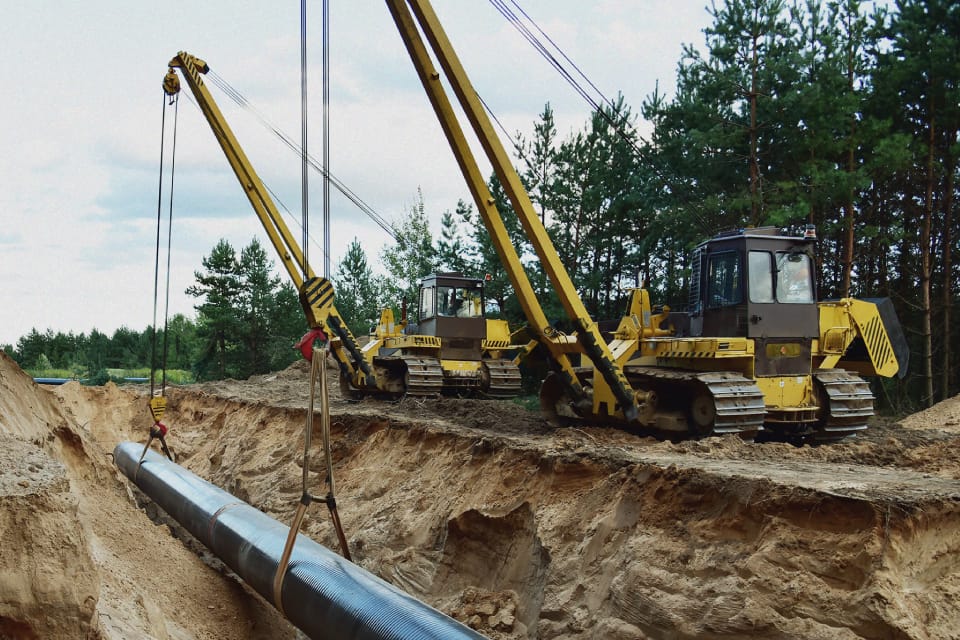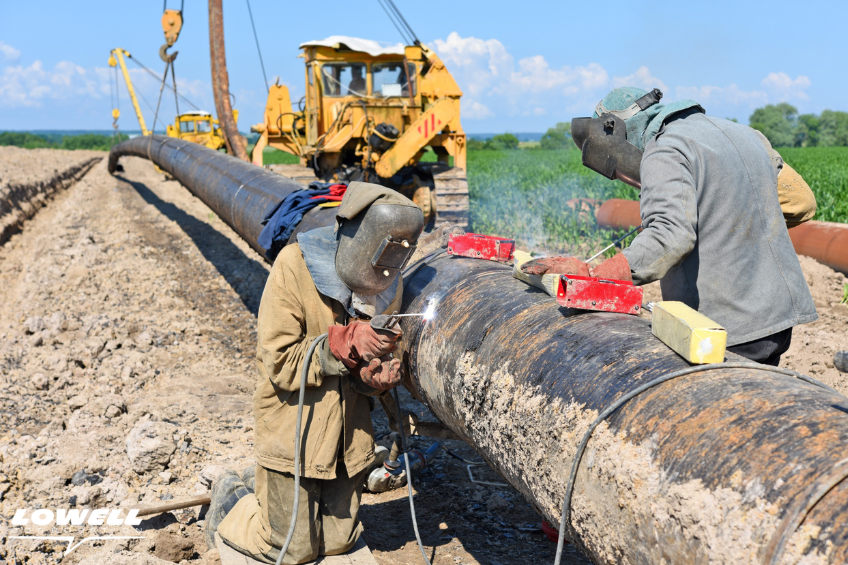Why Creek Pipe Company Is Pioneering Eco-Friendly Pipeline Materials
A Comprehensive Guide to Comprehending Pipelines and Their Duty in Construction
Pipes are necessary elements in building, serving crucial features in water, waste, and gas monitoring. Their choice and application can greatly influence a building's performance and safety and security. Numerous products, such as PVC, copper, and PEX, provide distinct advantages suited to details demands (Creek Pipe Pipeline Construction). Recognizing these aspects is essential for any construction task. As one checks out the complexities of pipelines, the ramifications for compliance and public health and wellness ended up being increasingly noticeable
The Value of Piping in Building
Pipes function as important avenues in building, facilitating the motion of water, gas, and waste throughout buildings and facilities. Their role expands past simple transportation; they are vital for ensuring the capability and safety and security of residential and commercial atmospheres. Properly set up pipelines contribute to the effective circulation of sources, allowing everyday tasks such as cooking, showering, and home heating. Moreover, pipelines play a pivotal role in waste administration, making certain that sewer and wastewater are efficiently eliminated from living spaces.The value of pipelines is additionally reflected in their impact on public health and wellness. Inadequate or defective piping systems can result in contamination and harmful problems, making high quality products and installment methods important. Furthermore, pipes should follow various building ordinance and regulations, which are designed to shield both owners and the setting. The significance of pipelines in building and construction includes both useful functionality and essential health and wellness considerations.
Sorts Of Piping Utilized in Structure Jobs
Various kinds of pipes play a considerable role in structure projects, each made to satisfy specific demands and applications. Among one of the most frequently utilized pipeline types are PVC, which is light-weight and resistant to rust, making it perfect for water drainage and vent systems. CPVC pipelines, similar to PVC, can withstand greater temperatures, usually used in hot water systems. Copper pipelines are known for their longevity and integrity, frequently utilized in plumbing and heating applications. Galvanized steel pipelines, while less typical today, were once a requirement for water supply lines as a result of their strength. In Addition, PEX (cross-linked polyethylene) pipes are getting appeal for domestic pipes due to their adaptability and resistance to scaling and chlorine. Ultimately, cast iron pipes are preferred for their sound-dampening residential properties, commonly utilized in waste and dirt systems. Each pipe kind offers distinct features, ensuring efficient procedure in building tasks.
Typical Products for Water Lines and Their Characteristic
In building, the selection of pipe materials is important for making certain resilience and performance. Metal pipes use toughness and resistance to high stress, while plastic pipelines give lightweight and corrosion-resistant alternatives. Composite pipes combine the benefits of both products, making them functional options for various applications.
Steel Pipeline Options
Steel pipelines are important parts in building and construction, supplying a series of alternatives that deal with various applications and ecological conditions. One of the most usual products consist of steel, copper, and cast iron. Steel pipelines are understood for their toughness and durability, making them ideal for high-pressure applications. Copper pipelines are preferred for their deterioration resistance and antimicrobial residential properties, usually used in pipes systems. Cast iron pipelines supply exceptional audio insulation and are ideal for waste and drainage systems. Each steel kind has distinct advantages; as an example, galvanized steel can stand up to corrosion, while stainless steel supplies remarkable corrosion resistance. Selecting the proper metal pipeline depends upon factors such as price, environmental exposure, and the details requirements of the building and construction job.

Plastic Pipeline Advantages
Plastic pipes have actually gained appeal in construction because of their light-weight nature and versatility. These pipelines, made from products such as PVC, CPVC, and PE, offer exceptional resistance to deterioration and chemical damage, making them appropriate for numerous applications. Their ease of setup further enhances their charm, as they can be reduced and joined without special devices. In addition, plastic pipelines are usually more affordable contrasted to steel alternatives, contributing to reduced total project costs. Their smooth interior surface areas lower rubbing and improve flow rates, while insulation homes aid keep temperature level control in pipes systems - Creek Pipe Company. With a large array of configurations and sizes available, plastic pipes efficiently satisfy the diverse requirements of contemporary building jobs
Compound Pipe Characteristics
Composite pipes integrate various products to utilize their specific toughness, causing boosted efficiency and durability. Typically, these pipes contain layers that might consist of porcelains, plastics, and metals, each adding distinct residential properties. For example, the inner layer might be made from a corrosion-resistant material, while the external layer gives toughness and effect resistance. This combination permits composite pipes to withstand severe temperatures and stress, making them ideal for a variety of applications, consisting of water and commercial processes. In addition, composite pipes are frequently lighter than traditional products, helping with easier handling and setup. Their flexibility and flexibility to different settings make try this out them a favored choice in modern-day building tasks, making sure longevity and performance in fluid transportation systems.
Applications of Pipeline in Pipes Systems

Electrical Avenues: The Function of Water Lines in Electrical wiring
In contemporary building and construction, electrical channels play a necessary role in making sure the reliable and risk-free directing of electric circuitry throughout structures. These pipelines offer a protective pathway for electric wires, safeguarding them from physical damages and environmental elements. Various materials, such as PVC, steel, and flexible conduits, are made use of depending upon the specific needs of the installation.Furthermore, avenues aid in arranging wiring systems, reducing the risk of electric hazards like brief circuits or fires. They additionally promote less complicated upkeep and upgrades, as cables can be accessed and replaced without considerable interruption to the structure.Proper setup of electric avenues is crucial for conformity with building ordinance and security guidelines. This structured strategy not just improves the durability of the electric system but additionally adds to the general safety and security and capability of the structure, making electric conduits crucial in modern construction practices.
Choosing the Right Pipe for Your Job
Just how can one ensure the right pipe selection for a building and construction project? The choice procedure starts with understanding the specific demands of the job, including the sort of liquids being carried, stress rankings, and ecological conditions. Product choices, such as PVC, copper, and steel, need to be examined based upon durability, rust resistance, and thermal properties.Next, one must take into consideration the pipeline's diameter and circulation capability to ascertain efficient procedure. basics Regulatory standards and codes should also be complied with, as they dictate the acceptable products and techniques for specific applications. Consulting with experts and utilizing considerable sources can further help in making educated decisions.Finally, assessing the cost-effectiveness of various options is crucial, balancing initial expenditures with long-lasting maintenance and substitute costs - Creek Pipe Texas. By meticulously evaluating these elements, one can confidently choose one of the most appropriate pipe for their building task, assuring both functionality and conformity

Upkeep and Evaluation of Pipes in Construction
Proper option of pipes sets the structure for their long-lasting performance, making upkeep and inspection critical elements in construction. Regular maintenance warranties that any kind of potential issues, such as leaks, corrosion, or blockages, are determined and dealt with promptly, minimizing expensive fixings and job hold-ups. Arranged examinations, including visual analyses and stress examinations, play a necessary role in examining the stability of pipeline systems.Additionally, checking ecological factors, such as temperature variations and soil problems, can assist anticipate wear and tear. Making use of innovative innovations, such as CCTV for interior inspections, can improve the performance of maintenance initiatives. It is important to record inspection findings and maintenance activities to develop a complete background of the pipe systems. By prioritizing maintenance and assessment, building and construction professionals can prolong the life-span of their piping systems, ensuring they operate successfully and accurately throughout the project's duration.
Regularly Asked Inquiries
Just How Do Pipes Impact Energy Effectiveness in Structures?
Pipelines substantially influence power efficiency in structures by controling heating and cooling systems. Correct insulation and materials lower power loss, while efficient pipes styles minimize water use, eventually resulting in lower power consumption and operational expenses.
What Rules Govern Pipe Installment in Building And Construction?
Regulations controling pipeline installment in building commonly consist of nationwide and regional structure codes, plumbing codes, and safety and security standards. click for info These guarantee conformity with architectural integrity, product requirements, and wellness needs, advertising safety and security and effectiveness in construction techniques.
Can Pipes Be Recycled After Usage?
The inquiry of pipeline recyclability is considerable. Several materials, such as metal and certain plastics, can be recycled efficiently. Nonetheless, the problem and sort of pipeline impact recycling expediency, necessitating appropriate analysis before disposal.
Exactly How Do Climate Condition Influence Pipe Efficiency?
Climate condition considerably influence pipe efficiency. Extreme temperatures can trigger development or contraction, while moisture may lead to corrosion. Furthermore, heavy precipitation can boost soil stress, influencing stability and total performance of the piping system.
What Are the Signs of Pipeline Failure to Look For?
Signs of pipeline failing consist of leakages, uncommon sounds, staining of water, minimized water stress, and noticeable deterioration. Routine assessments can assist spot these problems early, protecting against costly repairs and ensuring system capability in the long term. Pipelines play a pivotal role in waste monitoring, making certain that sewer and wastewater are properly removed from living spaces.The importance of pipelines is also mirrored in their impact on public wellness. In construction, the option of pipeline materials is vital for making certain longevity and performance. Metal pipelines supply strength and resistance to high stress, while plastic pipes supply light-weight and corrosion-resistant options. Additionally, pipes are utilized to get rid of wastewater, attaching bathrooms, sinks, and drains pipes to local sewer systems or septic tanks.Different types of pipes, such as PVC, copper, and PEX, are selected based on factors like longevity, cost, and certain application requirements. Exactly how can one ensure the ideal pipeline option for a construction job?